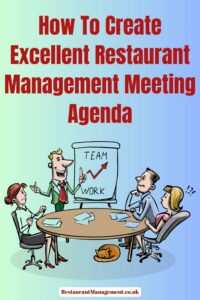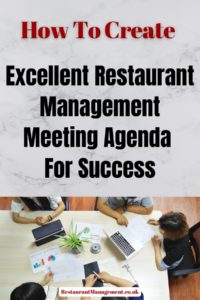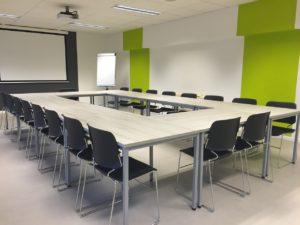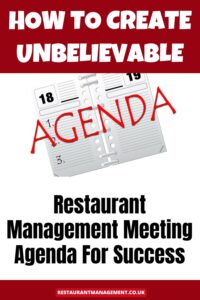Effective Restaurant Management Meeting Agenda
Managing a restaurant is about more than just crafting the perfect menu or creating a welcoming atmosphere. It’s a complex operation requiring precise coordination, clear communication, and effective planning. Regular restaurant management meetings are vital for ensuring everyone is on the same page, driving the business toward success. This article highlights how an effective restaurant management meeting agenda helps you streamline operations, improve communication, and ultimately enhance your restaurant’s performance.

The Importance of Regular Restaurant Management Meetings
Why Consistent Meetings Are Essential
In the dynamic world of restaurant management, regular meetings serve as the cornerstone for efficient operations and clear communication. They provide a regular forum for discussing performance, addressing issues, and planning future activities. Without regular check-ins, it’s easy for minor problems to escalate into major issues, for staff to feel disconnected, and for goals to become misaligned.
Benefits of Structured Agendas
A structured agenda is the blueprint for a successful meeting. It ensures that all important topics are covered, time is used efficiently, and everyone knows what to expect. This structure helps to keep the meeting focused, prevents it from running over time, and ensures that all participants have a clear understanding of their roles and responsibilities.
Long-Term Benefits
The long-term benefits of effective meetings include improved team cohesion, better decision-making, and enhanced operational efficiency. Regular check-ins ensure that everyone remains aligned with the restaurant’s goals and can adapt to changing circumstances.

Setting the Right Tone for Your Meetings
Creating a Positive Atmosphere
The tone of the meeting sets the stage for productive discussions. Creating a positive atmosphere involves more than just a friendly greeting. It’s about fostering an environment where team members feel valued and heard. Start by welcoming everyone warmly, with a bit of humour to lighten the mood. Remember, a positive atmosphere encourages open communication and collaboration.
Encouraging Open Communication
Open communication is critical in any management meeting. Team members should be encouraged to share their thoughts, concerns, and ideas by actively listening and asking open-ended questions to ensure that all voices are heard. Transparency in these discussions can lead to more innovative solutions and a stronger, more cohesive restaurant team.
Preparing for the Meeting
Identifying Key Participants: Who Should Attend
The success of a restaurant management meeting agenda often hinges on having the right people in the room. Typically, this includes the restaurant owner, general manager, head chef, front-of-house manager, and other key department heads. Each participant brings a unique perspective and insights crucial for comprehensive decision-making.
Roles and Responsibilities
Clarifying roles and responsibilities ahead of time can streamline the meeting. Assign specific topics to each participant based on their expertise. For instance, the head chef can discuss menu changes and kitchen operations, while the front-of-house manager can report on customer feedback and staff performance. This division of labour ensures that all relevant areas are covered without overlap or redundancy.
Setting Clear Objectives
Defining Meeting Goals
Before diving into the meeting, it’s essential to define clear objectives. Are you reviewing last month’s performance? Planning upcoming events? Addressing specific challenges? Having well-defined goals keeps the meeting focused and ensures all discussions align with the restaurant’s broader objectives.
Aligning Objectives with Restaurant Goals
Each meeting should contribute to your restaurant’s overall goals. Whether it’s improving customer satisfaction, increasing sales, or enhancing team efficiency, aligning your meeting objectives with these goals ensures that every discussion is purposeful and contributes to your long-term success.
Creating a Detailed Agenda
Essential Components of an Effective Agenda
An effective agenda typically includes the following components:
- Welcome and introductions
- Review of previous meeting minutes
- Current restaurant performance overview
- Operational updates
- Marketing and promotions
- Menu and culinary development
- Staff training and development
- Financial management
- Customer service and experience
- Technology and innovation
- Sustainability and green initiatives
- Interactive segments for team input and brainstorming
- Action items and accountability
- Closing remarks and next meeting scheduling
Customising the Agenda for Your Restaurant
While the components listed above provide a solid foundation, it’s essential to customise the agenda to suit your restaurant’s specific needs. Consider your restaurant’s unique challenges, goals, and team dynamics when crafting the agenda. Customisation ensures that the meeting is relevant and addresses your restaurant’s most pressing issues.
The Ultimate Powerful Tools For Remote Restaurant Management Operation
Meeting Agenda Outline
Welcome and Introductions: Opening the Meeting
Start the meeting on a positive note. A warm welcome sets the tone and helps to create a relaxed atmosphere. Briefly outline the meeting’s agenda and objectives to provide a clear direction for all participants.
Introducing New Team Members
If there are any new team members, introduce them at the beginning of the meeting to make them feel welcome and ensure that everyone is aware of any new additions to the team.
Review of Previous Meeting Minutes
Recap of Last Meeting
Review the minutes from the previous meeting, which helps refresh everyone’s memory and provides a starting point for discussing ongoing issues and projects.
Addressing Unfinished Business
Identify any items from the previous meeting that still need to be resolved. Discuss the progress made on these items and determine what steps must be taken to complete them.
Current Restaurant Performance Overview
Sales and Revenue Reports
Reviewing sales and revenue reports is critical for understanding your restaurant’s financial health. Discuss trends, identify areas of concern, and celebrate successes. Use visual aids like graphs, charts and case studies to make the data more accessible.
Customer Feedback and Reviews
Using data from Customer feedback to help provides valuable insights into how the restaurant is doing, what is working well and what needs improvement. Discuss recent reviews and feedback, and develop action plans to address any negative comments.
Inventory and Supply Chain Status
Review the current status of inventory and supply chains. Identify any issues with suppliers, discuss stock levels, and plan for future needs to ensure smooth operations.
Operational Updates
Staff Schedules and Rosters
Discuss upcoming staff schedules and rosters. Ensure that shifts are covered and address any staffing concerns. Consider using scheduling software to streamline this process and avoid conflicts.
Maintenance and Repairs
Review the status of any ongoing maintenance and repair work. Ensure that all necessary tasks are addressed to maintain a safe and functional environment for staff and customers.
Health and Safety Compliance
Health and safety compliance is non-negotiable in the restaurant industry. Review current compliance status, discuss any recent inspections, and plan for upcoming checks to ensure adherence to all regulations.
Marketing and Promotions
Upcoming Campaigns and Events
Marketing is vital in the restaurant industry in attracting and retaining customers. Discuss upcoming campaigns and events, evaluate their progress, and brainstorm new ideas. Use data from past promotions to inform future strategies.
Social Media and Online Presence
Your restaurant’s online presence can significantly impact its success. Review your social media and online marketing efforts, analyse engagement metrics, and plan for future posts and campaigns.
Local Community Engagement
Engaging with your local community can significantly enhance your restaurant’s reputation and attract new customers. Discuss current community involvement and plan future initiatives to strengthen these relationships.
Menu and Culinary Development
New Menu Items
Innovation in your menu can set your restaurant apart from competitors. Discuss any new menu items, their performance, and potential adjustments. Consider gathering input from both customers and staff to enhance these offerings.
Seasonal Changes
Adapting your menu to seasonal changes can keep it fresh and appealing. Plan for upcoming seasonal adjustments, ensuring that your offerings align with customer preferences and ingredient availability.
Special Dietary Requirements
Catering to special dietary requirements can expand your customer base. Discuss how well your menu accommodates these needs and identify opportunities for improvement.

Staff Training and Development
Upcoming Training Sessions
Investing in staff training ensures that your team is well-prepared to deliver excellent service. Plan for upcoming training sessions, prioritising areas for improvement and new skill development.
Performance Reviews
Regular performance reviews provide an opportunity for constructive feedback and professional growth. Discuss recent reviews, highlight top performers, and address any areas of concern.
Employee Recognition Programs
Recognising and rewarding employees for their hard work can boost morale and retention. Plan for upcoming recognition programs, ensuring all team members feel valued and appreciated.
Financial Management
Budget Review
Regularly reviewing your budget helps to keep finances on track. Discuss current financial status, identify any discrepancies, and plan for future expenses to ensure fiscal responsibility.
Cost-Saving Measures
Explore cost-saving measures that can improve your bottom line without compromising quality. Discuss potential strategies and their implementation.
Investment Opportunities
Identify potential investment opportunities that can enhance your restaurant’s growth and profitability. Discuss their feasibility and possible impact on your business.
5 Simple But Powerful Restaurant Management Goals For Your Success
Customer Service and Experience
Enhancing Customer Interactions
Exceptional customer service is crucial for success. Discuss ways to enhance customer interactions, from greeting guests to handling complaints effectively.
Handling Complaints and Issues
Promptly and effectively addressing customer complaints can transform a negative experience into a positive one. Review recent complaints, analyse their root causes, and develop strategies for improvement.
Loyalty Programs and Incentives
Loyalty programs can encourage repeat business. Discuss current programs, their success, and potential enhancements to increase customer retention.
Technology and Innovation
Implementing New Systems
Staying up-to-date with technology can improve efficiency and customer experience. Discuss any new systems or technologies that need to be implemented and plan for their integration.
Upgrading Existing Technology
Review the performance of existing technology and identify any areas that need upgrading. Plan for these upgrades to ensure that your restaurant remains competitive and efficient.
Training Staff on New Tools
New tools are only effective if staff know how to use them. Plan for training sessions to ensure that all team members are comfortable and proficient with the latest technologies.
Sustainability and Green Initiatives
Waste Reduction Strategies
Reducing waste is not only good for the environment but also for your bottom line. Discuss current waste reduction strategies and identify areas for improvement.
Sustainable Sourcing
Sourcing ingredients sustainably can enhance your restaurant’s reputation and appeal to environmentally conscious customers. Review your current sourcing practices and plan for future improvements.
Energy Efficiency Measures
Improving energy efficiency can lead to lower costs and decreased environmental impact. Discuss current energy usage and identify potential measures to improve efficiency.
Interactive Segments
Open Floor for Team Input
It is crucial to foster an atmosphere where team members feel at ease voicing their ideas and concerns. An open floor segment can yield valuable insights and promote innovative solutions.
Addressing Team Concerns
Address any concerns raised by team members, ensuring everyone feels heard and valued. This approach can boost morale and promote a collaborative environment.
Brainstorming and Problem Solving
Collaborative brainstorming sessions can lead to creative solutions to challenges. Encourage team members to contribute ideas and work together to solve problems.

Action Items and Accountability
Assigning Tasks
Assign specific tasks to team members, ensuring that everyone knows their responsibilities. This clarity can improve accountability and ensure that tasks are completed efficiently.
Setting Deadlines
Setting clear deadlines for all tasks to ensure timely completion helps keep the team focused and on track.
Follow-Up Procedures
Establish follow-up procedures to monitor progress and ensure that tasks are completed as planned. Regular check-ins help to identify and address any issues early on.
Closing the Meeting
Summarising Key Points and Decisions
Recap the key points and decisions made during the meeting to ensure everyone is clear on what was discussed and what needs to be done moving forward.
Ensuring Clarity and Understanding
Ask if there are any questions or points that need further clarification. Ensuring that everyone understands the discussions and decisions is crucial for effective implementation.
Scheduling the Next Meeting
Determine the date and time for the next meeting. Setting a preliminary agenda helps keep the team focused and prepared for the next discussion.

Related articles:
Tools For Remote Restaurant Management
Restaurant Manager Goals And Objectives
How To Become A Restaurant Manager
Conclusion
Effective restaurant management meeting agenda plays a vital role in the success of restaurants, going beyond mere discussions to drive performance and foster teamwork. By following the guidelines in this article, restaurant owners and managers can create agendas that facilitate clear communication and contribute significantly to their establishments’ overall success.
It is essential to understand that the purpose of holding meetings goes beyond mere formality; instead, it is about ensuring that they serve a meaningful and influential purpose. When meetings are structured with clear objectives and accountability measures, they become powerful instruments for enhancing performance and efficiency within the restaurant.
By prioritising effective communication and strategic planning through well-structured management meetings, restaurant owners and managers can promote shared responsibility and unity within their establishments. These meetings align team efforts, address challenges, and capitalise on opportunities, ultimately driving the restaurant towards sustained growth and prosperity.
Frequently Asked Questions (FAQs)
What is the best frequency for restaurant management meetings?
The best frequency for restaurant management meetings depends on your restaurant’s size and needs. However, a common practice is to hold weekly meetings for operational updates and monthly meetings for more strategic discussions.
How can I ensure all team members are engaged during the meeting?
To ensure engagement, create a positive atmosphere, encourage open communication, and involve team members in discussions. Assign specific topics to individuals based on their expertise and use interactive segments to foster participation.
What tools can help create and manage meeting agendas?
Several tools can assist in creating and managing meeting agendas, including project management software like Trello or Asana and scheduling tools like Doodle or Google Calendar. These tools help streamline the process and ensure all tasks are tracked and completed.
How do I handle conflicts or disagreements during meetings?
Handling conflicts or disagreements requires a calm and objective approach. Listen to all sides, acknowledge their perspectives, and work towards a collaborative solution. Setting clear ground rules for discussions can also prevent conflicts from escalating.
What are some practical methods for evaluating the effectiveness of these meetings?
Measuring the success of meetings can be done by evaluating the completion of action items, monitoring performance metrics improvements, and gathering participant feedback. Regularly reviewing these factors can help to ensure that meetings remain effective and productive.
How can I make remote management meetings more effective?
To make remote management meetings more effective, use reliable video conferencing tools, ensure all participants can access necessary documents beforehand, and follow a structured agenda. Encourage active participation and use breakout rooms for smaller group discussions.
What should I do if the meeting consistently runs over time?
If meetings consistently run over time, review the agenda to identify any areas that can be streamlined. Set clear time limits for each topic and encourage participants to stay focused. Using a timer or assigning a timekeeper can also help to keep the meeting on track.
How can I incorporate feedback from staff into the meeting agenda?
Incorporating feedback from staff can be done by regularly soliciting their input through surveys or suggestion boxes. Discuss this feedback during meetings and use it to inform agenda topics and decision-making processes.
What are some tips for keeping the meeting focused and productive?
To keep meetings focused and productive, set clear objectives, follow a structured agenda, assign roles and responsibilities, and encourage active participation. Use visual aids to present data and summarise key points to ensure understanding.


